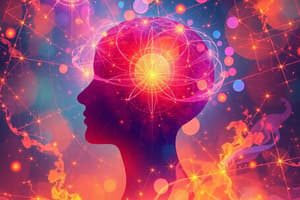Podcast
Questions and Answers
Que técnica é útil para mellorar a autoconsciencia emocional?
Que técnica é útil para mellorar a autoconsciencia emocional?
- Negar emocións negativas
- Ofrecer críticas construtivas
- Practicar técnicas de atención plena (correct)
- Evitar situaciones sociais
Cal é unha idea errónea común sobre a intelixencia emocional?
Cal é unha idea errónea común sobre a intelixencia emocional?
- Só se trata de ser amable. (correct)
- Implica aprender dos erros.
- Inclúe habilidades de comunicación.
- É importante para a conexión social.
Que acción pode fomentar a intelixencia emocional a través da interacción social?
Que acción pode fomentar a intelixencia emocional a través da interacción social?
- Evitar feedback para non ser criticado
- Analyzar respostas emocionais pasadas
- Manter distancias para reducir conflitos
- Buscar oportunidades para a interacción social (correct)
Que habilidade contribúe á interpretación efectiva de emocións en situacións sociais?
Que habilidade contribúe á interpretación efectiva de emocións en situacións sociais?
Por que é esencial desenvolver a intelixencia emocional na vida profesional?
Por que é esencial desenvolver a intelixencia emocional na vida profesional?
Que é a intelixencia emocional?
Que é a intelixencia emocional?
Que implica a auto-consciencia dentro da intelixencia emocional?
Que implica a auto-consciencia dentro da intelixencia emocional?
Que implica a auto-regulación como parte da intelixencia emocional?
Que implica a auto-regulación como parte da intelixencia emocional?
Como se define a empatía na intelixencia emocional?
Como se define a empatía na intelixencia emocional?
Que beneficios trae a intelixencia emocional na vida profesional?
Que beneficios trae a intelixencia emocional na vida profesional?
Que é importante para a motivación dentro do contexto da intelixencia emocional?
Que é importante para a motivación dentro do contexto da intelixencia emocional?
Cal é un dos principais beneficios da intelixencia emocional nas relacións persoais?
Cal é un dos principais beneficios da intelixencia emocional nas relacións persoais?
Que habilidades son fundamentais dentro das habilidades sociais en intelixencia emocional?
Que habilidades son fundamentais dentro das habilidades sociais en intelixencia emocional?
Flashcards
Autoreflexión
Autoreflexión
Pensar e analizar as propias emocións e comportamentos de forma regular.
Buscar feedback
Buscar feedback
Pedir opinións e comentarios a outras persoas de confianza.
Técnicas de mindfulness
Técnicas de mindfulness
Prestar atención ao presente, aumentar a consciencia das emocións e pensamentos.
Aprender dos erros
Aprender dos erros
Signup and view all the flashcards
Comunicación e escuta activa
Comunicación e escuta activa
Signup and view all the flashcards
Intelixencia emocional (IE)
Intelixencia emocional (IE)
Signup and view all the flashcards
Autocoñecemento
Autocoñecemento
Signup and view all the flashcards
Autoregulación
Autoregulación
Signup and view all the flashcards
Motivación
Motivación
Signup and view all the flashcards
Empatía
Empatía
Signup and view all the flashcards
Habilidades sociais
Habilidades sociais
Signup and view all the flashcards
Importancia da IE
Importancia da IE
Signup and view all the flashcards
Definición de IE
Definición de IE
Signup and view all the flashcards
Study Notes
Introduction to Emotional Intelligence
- Emotional intelligence (EI) is the ability to understand and manage one's own emotions, and to recognize and influence the emotions of others.
- It encompasses self-awareness, self-regulation, social skills, empathy, and motivation.
- EI is increasingly recognized as a crucial factor in personal and professional success.
Components of Emotional Intelligence
- Self-awareness: Understanding one's own emotions, strengths, weaknesses, drives, values, and impact on others.
- Recognizing and naming emotions as they arise.
- Accurately assessing one's own strengths and weaknesses.
- Possessing a realistic self-image.
- Self-regulation: Managing one's emotions in a healthy and effective way.
- Controlling impulses and reactions.
- Adapting to change and managing stress.
- Maintaining composure under pressure.
- Demonstrating honesty and integrity.
- Motivation: Driving oneself forward with enthusiasm and persistence.
- Pursuing goals with energy and optimism.
- Demonstrating initiative and drive.
- Showing commitment to high standards.
- Accepting new challenges.
- Empathy: Understanding and sharing the feelings of another person.
- Identifying the emotions of others.
- Demonstrating concern and compassion for others.
- Active listening and genuine interest in others.
- Understanding diverse perspectives.
- Social skills: Managing relationships effectively and building networks.
- Communicating clearly and persuasively.
- Building strong rapport with others.
- Negotiating and resolving conflicts effectively.
- Inspiring and leading others.
- Collaborating and working effectively in teams.
Importance and Applications of Emotional Intelligence
- Personal life: Better relationships, improved self-understanding, reduced stress, enhanced decision-making.
- Professional life: Successful leadership, effective teamwork, improved communication, stronger interpersonal relationships, reduced conflict.
- Leadership: Inspiring and motivating followers, fostering collaboration, managing diverse teams effectively, resolving interpersonal conflicts.
- Customer service: Understanding customer needs and concerns, resolving customer issues effectively, building rapport, enhancing customer loyalty.
- Healthcare: Effective communication with patients, building trust, reducing stress in healthcare settings, improving patient care.
Developing Emotional Intelligence
- Self-reflection: Regularly reflecting on one's own emotions and behaviors.
- Seeking feedback: Actively soliciting feedback from trusted sources.
- Practice mindfulness techniques: Focusing on the present moment to enhance awareness of emotions.
- Learning from mistakes: Analyzing past emotional responses to understand patterns and improve.
- Seeking out opportunities for social interaction: Building connections with others to experience diverse perspectives and emotional responses.
- Developing communication and active listening abilities: Effectively discussing and interpreting situations and emotions.
- Reading literature and studying relevant topics: Expanding knowledge and understanding of emotions and interpersonal dynamics.
Misconceptions about Emotional Intelligence
- Some believe EI is only about being "nice" or "pleasant." This is incorrect, self-regulation involves managing emotions, not just experiencing them.
- Others wrongly assume EI is solely about empathy, neglecting the role of self-awareness and social skills.
Conclusion
- Emotional intelligence is a crucial skillset that has significant personal and professional implications across various spheres of life.
- Its development can lead to improved relationships, better decision-making, enhanced communication, and overall well-being.
- It's a valuable asset to cultivate in both personal and professional environments.
Studying That Suits You
Use AI to generate personalized quizzes and flashcards to suit your learning preferences.




